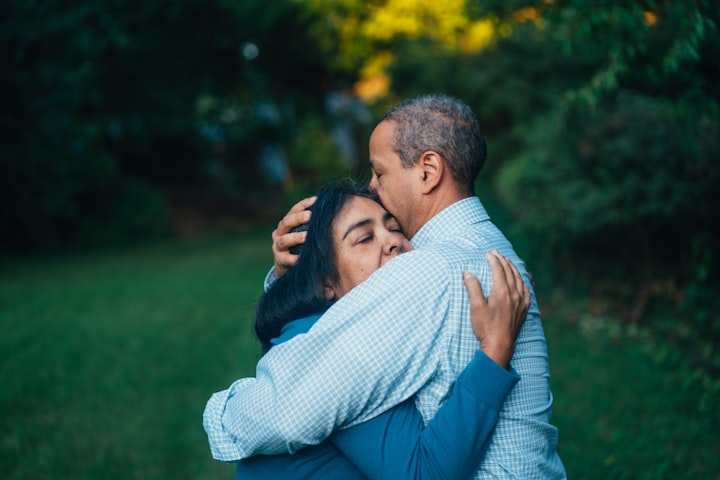Should We Forgive Murderers?
A Conversation on Forgiveness vs Absolution

In my original post on Vocal Media, The Art of Healing: Forgiveness & Reconciliation, Dharrsheena Raja Segarran commented, "I'm struggling with forgiveness, to be honest. It's like asking me to forgive something that I will never be okay with. For example, let's take murder. I don't think anyone would be okay with that. So how do we forgive someone who murdered? And if we do, does that mean we are okay with murder? It's all just too complicated."
That question alone prompted me to write this post. While forgiveness may seem like an unlikely topic when discussing the aftermath of a murder, it is an essential part of the healing process for those left behind.
Forgiveness is not a personal pardon or exoneration of someone for their wrongdoing, accountability, or justice. That is a legal concept separate from the emotional process of forgiveness. Likewise, forgiveness is not about absolving the murderer of their crime, excusing their actions, or minimizing the crime's severity or the pain it has caused.
Instead, forgiveness is a personal and internal process entirely under our control. It's about letting go of the anger and resentment we may be holding onto and finding a path toward healing and recovery. It's natural to experience grief and other intense emotions in response to such a traumatic event.
Instead, forgiveness is a personal choice to let go of anger and resentment and to move forward with hope and positivity. It's a way of releasing the emotional burden that we carry when someone has hurt us and choosing to focus on our own healing and growth.
ACCEPTANCE OF LOSS
When we experience loss, whether it's the passing of a loved one or a tragic event that affects our community, it can be challenging to come to terms with what has happened.
Oprah Winfrey once asked, "Where do we go from here?" This question is a powerful reminder that forgiveness is not the end goal but a starting point for healing and growth.
When we ask ourselves, "Where do we go from here?" we acknowledge that the past cannot be changed. We can't undo the hurt caused, but we can choose how we move forward. We can choose to hold onto our anger and resentment, or we can choose to let it go and focus on building a better future.
Forgiveness, in this context, means acknowledging the reality of the situation. It means accepting that the lost person is gone and that we cannot change that fact. This can be incredibly challenging, but it's a necessary step in our healing journey.
Acceptance doesn't mean that we are okay with what has happened. It doesn't mean we are no longer grieving or feeling the pain of our loss. Instead, it's a way of acknowledging the truth of the situation and allowing ourselves to move forward. So, yes, I am encouraging moving forward through the pain and not despite it or after it is over.
We prolong our suffering when we hold onto anger, resentment, or bitterness in the face of loss. We are denying ourselves the opportunity to find peace and healing amid tragedy. By embracing acceptance and forgiveness, we are opening ourselves up to the possibility of growth and transformation.
Of course, this is easier said than done. Accepting loss and finding forgiveness can be a long and difficult journey. It requires a deep sense of self-compassion, patience, and the support of those around us. But ultimately, it's a journey that is worth taking.
We can find meaning and purpose amid our pain by embracing forgiveness and acceptance. We can honor the memory of those we have lost by living with compassion, empathy, and love. And we can move forward with hope and resilience, knowing that even in the face of tragedy, we have the power to heal and grow.
A TRUE STORY
We met only about a month before the day back in August 2015. As I was walking to the breakroom of our job. I saw her standing at the back door holding what must have been (my memory fails me) a blanket or her jacket. She was looking forward, but not at me, kinda through me.
Watching her blank stare, I slowed my brisk stride and asked what was wrong, but I did not receive an answer. So I grabbed her and asked again. She said, "CJ is gone." I don't even remember what I said. The police were coming to pick her up. She was going to see her child's body.
The rest of the day was a blur. I remember not being able to get off work with her. I had to finish my shift. I showed up at her apartment with a neighbor friend of mine. I cried for my friend. I could not understand why this had happened. I was even angry about the way CJ had passed.
My friend was weeping, cleaning, and moving back home with her family all at once. Lost her baby boy, left her job, left her apartment, and returned back to her hometown.
Ashley Gooden-Stewart began The Baby Stewart Foundation months after CJ was gone. I believe that Ashley accepted the reality of her loss and asked, "Where do we go from here?"
Ashley decided to help inform her community on how to make transporting infants safer, give more to the homeless, and help new moms transition from single to motherhood. As a result, she has been doing the most good in her community from 2015 to the present. So this was her answer to where she was going from her present situation.
**********************************************************************
To give to The Baby Stewart Foundation via Ashley Gooden's Cash App.
**********************************************************************
GROWING THROUGH GRIEF
Ashley says in her book Growing Through Grief, "If you lost a loved one, you have probably struggled with who you are. I know I did. Guess what? I am still evolving! When you're experiencing a primary loss (loss of a loved one), no one ever mentions the secondary loss you experience (loss of identity). After losing a child, a parent may even question if they are still a parent."
This is recommended reading for anyone who has experienced the loss of a loved one in any situation, whether that loss was at the hand of another, illness, or natural causes.
Losing a child is a devastating experience that can leave a lasting impact on a parent's life. While it's true that time can ease some pain, the reality is that the pain never truly goes away. Instead, it's something that parents carry with them for the rest of their lives.
GETTING SUPPORT
Through PocketfulofHopeGriefCoaching.com, Ashley offers one-on-one coaching to other mothers who have experienced the loss of a child. While the road to healing after losing a child is long and complex, coaching can provide a source of hope and support along the way.
Ashley is an extreme embodiment of what it looks like to move forward through the pain of loss and not attempt to go around it. I am not asking you to start a non-profit coaching service or write a book. But moving forward is possible; if you are a parent who has experienced the loss of a child, know that resources are available to help you in your journey.
When we experience loss, whether it's the passing of a loved one or a tragic event that affects our community, it can be challenging to come to terms with what has happened. But we can get through with the help of our family, friends, and other resources.
Loss can be tough to process, whether it be the death of a loved one or a traumatic event that impacts our community. During these times, it's essential to have a support system in place. Our family and friends can provide comfort and strength, providing a safe space to express our emotions and share our experiences.
In addition to our personal support network, other resources are available to help us navigate the challenges of loss. Support groups, therapy, and counseling can provide valuable guidance and support as we work through our grief.
Remembering that we don't have to face these difficult times alone is essential. With the help of our loved ones and other resources, we can find the strength and resilience to get through even the most challenging experiences.
If you or someone you know is struggling with the pain of loss, reach out for help. There is no shame in seeking support; it can make all the difference in our journey toward healing and recovery.
AT THE END OF THE DAY, FORGIVE
Once you have come to accept, get support, and start dealing with your grief, you still ask, How do I forgive this person who took my loved one's life?
You have read this deep into the article, and I still haven't mentioned forgiving the murderer. It is because forgiveness is for you and given by you. Forgiveness is a pre-approval process that allows us to heal, move forward with our lives and find a sense of peace.
The murderer is being taken care of by their own sense of guilt, the public, law, and I hope justice is being served on a cold platter.
Your forgiveness towards that person does not free them from their wrongdoing. You do no good to undermine your pain by sending them any sense of spiritual relief. Allow God and the law to take care of them. Give them no further thought than that of accepting what they did.
To start the journey towards forgiveness, it's essential to let go of the thought of their wrongdoing. Reviewing the story repeatedly or trying to make sense of their actions can be tempting, but ultimately, it may not bring us closer to healing. So instead, we must accept that it may never make sense and ask ourselves, "Where do we go from here?"
Ashley's advice to grow through our grief, not go around it, is essential to remember. It may be a long and challenging journey, but there is always time to start.
About the Creator
Queen of Forgiveness™
Exploring the synergy of mind, body, & spirit through advanced technology & group life coaching. Here to inspire prosperity & longevity. To dive deeper with me 🔗 click here. #LiveLongAndProsper






Comments
There are no comments for this story
Be the first to respond and start the conversation.